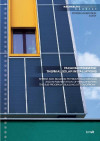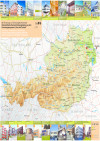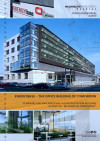Suchergebnisse
scaleFLEX - Scalable method for optimizing the energy flexibility of districts
Development of a decentrally organized automation method for improving the demand-side flexibility options of buildings and districts. The utilized data-driven algorithm promise high scalability and therefore low installation and operating costs. The developed method will be validated using different building types (high-tech office buildings, low-tech office buildings, residential buildings).
IEA ECBCS Annex 51 Experts Workshop: Energy Efficient Communities
2. - 3. October 2012
Tribühne Lehen, Tulpenstraße 1, 5020 SalzburgSalzburg, AT
Presentations of current results of research projects related to cross-building and energy optimised solutions for communities with the possibility of discussion and networking of national and international experts.
E_PROFIL - neighborhood profiles for optimized energy transformation processes
E_PROFIL is a set of methods (an IT-supported toolkit) for the elaboration of neighbourhood profiles. The aim of the project is to facilitate an energy and resource efficient development in the planning practice of Austrian cities. Furthermore, the project is an important asset for research and planning activities in Europe and can also be applied to other neighbourhoods.
MuT - Monitoring of urban Technologies: Classification, Specification, Evaluation
In the frame of the project a classification system for Smart City Technologies had beed developed, the relevance of a wide range of technologies in terms of their potential contribution to the development of sustainable and more resilient cities with a high quality of life had beed evaluated and a comprehensive classification of the technical maturity of relevant technologies, technical (sub-)systems and technology-related services had been given.
Renovation of the "Gründerzeit" building Eberlgasse in passive house standard
Based on the latest available technical capabilities, the renovation of Eberlgasse 3 will show that passive house standard is achievable even in a typical 19th century building.
CiQuSo - City Quarters with optimised solar hybrid heating and cooling systems
The project CiQuSo aimed to develop, evaluate and optimize concepts for solar energy systems to provide energy for buildings and cities. The applicability of the developed methods and concepts were shown as an example at Itzling, a part of Salzburg city.
Development of thermal solar systems with unproblematic stagnation behaviour
Research on the influence of collector hydraulics, piping and the arrangement of plant components on the stagnation behaviour of thermal solar systems.
smartEXT - extended application boundaries for proven passive house technology
The present study aims to explore the application options for compact units (ventilation devices including micro heat pumps, developed for passive houses) in low energy buildings. Compact ventilation units for heat recovery, heating and domestic hot water shall bear the basic heating load, whereas peak loads shall be covered by newly-developed auxiliary heating equipment combined with intelligent control algorithms. This allows increased energy efficiency as well as cost effectiveness together with higher living quality and lower ecological load.
Facade-Integrated Thermal Solar Installations

System and building physics fundamentals and implementatio of results within the subprogram "Building of Tomorrow"
3/2001
Herausgeber: BMVIT
Englisch, 6 Seiten
Downloads zur Publikation
Austrian demonstration projects within the research programme "Building of tomorrow"

Austrian map with project descriptions
Herausgeber: BMVIT
Englisch, 2 Seiten
Downloads zur Publikation
Pathways to sustainable construction. Experiences and prospective European research strategies

The aim of this study is to investigate the international research context of the programme "Building of Tomorrow" (with a focus on central, eastern and southern European countries) and to identify co-operation potentials.
Indicators for urban areas – for construction, operation and mobility in climate-friendly areas
Development and coordination of indicators for energy and ecological evaluations of urban areas based on the Swiss 2000-Watt certification system. The results will be used for the development of a quality assurance system for urban areas similar to the klimaaktiv declaration for buildings and the e5 certification for communities.
International Conference on Solar Heating and Cooling for Buildings and Industry
23. - 25. September 2013
Konzerthaus Freiburg, Konrad-Adenauer-Platz 1
79098 Freiburg, DE
The SHC 2013 conference offers a unique discussion platform for the international solar thermal community.
THERM-opti-BALCONY-P2 - Thermal Optimized Renovation of Balconies Phase 2: In-Situ-Pilot-Station
Pre-cast cantilever balconies represent a particular problem in the case of thermal rehabilitation of buildings. With the THERM-opti-BALKON-System a solution is currently being investigated under laboratory conditions. Phase 2 aims to create an in-situ-pilot-station. The most important object of study is the long-term behavior of the THERM-opti-BALKON-System.
Evaluation of temperature differentiation on a room-by-room basis in passive house apartments
In the passive house Utendorfgasse a room–by-room temperature control was installed in 11 apartments. The experiences were evaluated from a technological and from a sociological point of view.
Poly2Facade - Innovative thermal self-regulating solar facades by means of functional polymers
The overall objective of the present project is to develop and implement an optimal overheating protection system based on polymeric materials. The aim is to reduce maximum room temperatures in buildings caused by facade integrated solar-thermal collectors in stagnation.
Criteria catalogue for quality assurance in the construction of passive houses built in wood
By means of a criteria catalogue possible sources of error in the construction of passive houses built in wood will be identified both craft specific and concerning the installation of house automation facilities. Solutions will be acquired, a controlling tool for construction sites will be offered.
aspern Vienna´s Urban Lakeside subproject 8: Overall Project Management Landmark Project "aspern+"
The Overall Project Management of the "Leitprojekt" includes the handling and supervision of the sub-projects, the reporting to the programme management and additionally the preparation and distribution of relevant results. Beyond that the project management is responsible to highlight possible synergies within other projects and to - if necessary - include these within the next steps.
Energybase - The Office Building of Tomorrow

Planning and implementing a demonstration building as part of "Building of Tomorrow"
Forschungsforum
3/2010
Herausgeber: BMVIT
Englisch, 6 Seiten
Downloads zur Publikation
Conference: Central Europe towards Sustainable Building
24. - 26. Sep 2007
Czech Technical UniversityPrague, CZ
CESB 07
